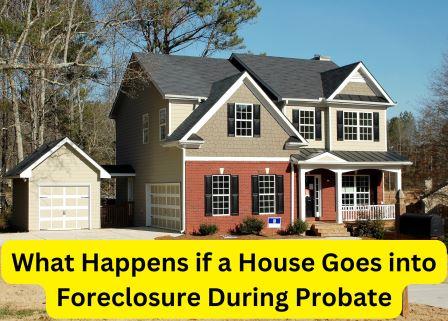If a house goes into foreclosure during probate, the estate is responsible for mortgage payments, and the lender can initiate foreclosure proceedings if payments are missed
When a loved one passes away, their property, including any home they own, becomes part of their estate. If there is an outstanding mortgage on the house, the estate is responsible for managing the mortgage payments during the probate process. But what happens if a house goes into foreclosure during probate? This blog will delve into the implications of foreclosure during probate, the role of the executor, the responsibilities of heirs, and practical solutions to prevent foreclosure. We will also explore a case study to understand this situation better.
Understanding Foreclosure and Probate
Foreclosure is a legal process in which a lender tries to recover the unpaid balance of a mortgage by selling the property. In probate, the deceased’s assets, including the house, go through a court-supervised process to settle debts and distribute any remaining assets to beneficiaries. However, the mortgage on the property doesn’t disappear, and foreclosure proceedings can start if payments aren’t made.
Probate, on the other hand, involves several steps, including validating the will, appointing an executor or personal representative, and managing estate affairs such as debts and taxes. When foreclosure occurs during probate, it complicates the process significantly. Heirs and the executor need to act swiftly to mitigate potential losses.
Key Factors in Foreclosure During Probate
- Mortgage Obligations Continue: The mortgage remains active, and the estate is responsible for making the payments. If payments stop, foreclosure may begin.
- Estate’s Financial Position: The estate must have enough liquidity to pay the mortgage. If not, the property might default, leading to foreclosure.
- Executor Responsibilities: The executor must handle the estate’s finances prudently, ensuring that the mortgage is paid, or other steps are taken to prevent foreclosure.
- State-Specific Laws: Foreclosure and probate laws vary by state. For example, some states may pause foreclosure actions during probate, while others may not.
What Happens If a House Goes Into Foreclosure During Probate?
When a house goes into foreclosure during probate, a few potential outcomes could occur:
- Foreclosure Proceedings May Begin: If the mortgage payments aren’t made, the lender can initiate foreclosure proceedings. The house could be sold to recover the debt.
- Sale of Property: A foreclosed property is often sold at auction for less than market value. This may result in a loss for the estate, impacting what heirs may inherit.
- Loss of Inheritance: If heirs are unable to pay off the mortgage or negotiate with the lender, they may lose their inheritance, which could include the home.
Executor’s Role in Preventing Foreclosure
The executor plays a critical role in preventing foreclosure during probate. Here are some options they can explore:
- Communicate with the Lender: The executor should contact the mortgage lender immediately to discuss the situation. Some lenders may offer temporary forbearance or other options to prevent foreclosure.
- Sell the Property: If the estate is unable to make mortgage payments, selling the home might be the best solution. The executor can sell the house before foreclosure, potentially at a higher price than at an auction.
- Refinance or Modify the Loan: The executor may work with the lender to refinance the loan or modify the terms, making it more manageable for the estate.
- Use Other Estate Assets: If the estate has other assets, they may be sold to cover the mortgage payments, preventing foreclosure.
Case Study: Preventing Foreclosure During Probate
Consider the case of the Johnson family. When Mr. Johnson passed away, he left behind a house with an outstanding mortgage. The executor, his daughter, was immediately faced with the challenge of making mortgage payments to avoid foreclosure. Unfortunately, the estate lacked liquid assets to cover the payments.
The executor quickly contacted the mortgage lender and was able to negotiate a temporary forbearance period. During this time, the executor arranged for the sale of another estate asset, which provided enough funds to keep the mortgage current. In the end, the house was saved from foreclosure, and the heirs retained their inheritance.
This case demonstrates how quick action, communication with lenders, and strategic use of estate assets can help prevent foreclosure during probate.
Read Also- How Long Does Foreclosure Take in Florida? A Comprehensive Guide
FAQs
Are mortgage payments paused during probate?
No, mortgage payments do not pause automatically during probate. The executor must continue making the payments.
Does probate stop foreclosure in California?
No, probate does not stop foreclosure in California. However, the executor can file a legal motion to delay foreclosure.
How does a house end up in foreclosure?
A house goes into foreclosure when the borrower fails to make mortgage payments, leading the lender to initiate foreclosure to recover the debt.
Can a house be foreclosed on while in probate in Florida?
Yes, a house can be foreclosed on during probate in Florida, but the executor can negotiate with the lender to delay or prevent it.
Let’s Summarize…
When a house goes into foreclosure during probate, the situation becomes more complex, as the estate is responsible for managing mortgage payments. The executor needs to take proactive steps like contacting the lender, refinancing, or selling assets to prevent the loss of the property. While foreclosure during probate can result in the loss of inheritance for heirs, swift action and legal guidance can help mitigate the risks.
